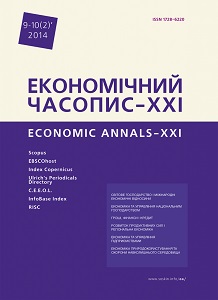NATIONAL ECONOMIES INTELLECTUALIZATION EVALUATING IN THE WORLD ECONOMY
NATIONAL ECONOMIES INTELLECTUALIZATION EVALUATING IN THE WORLD ECONOMY
Author(s): Alla Samoylenko, Sergii Eduardovich SardakSubject(s): Economy
Published by: Institute of Society Transformation
Keywords: intellectualization; national economy; world economy; index
Summary/Abstract: The state of national economies development varies and is characterized by many indicators. Economically developed countries are known as doubtless leaders that are in progress and form political stability, social and economics standards, scientific and technical progress and determine future priorities. It is worth mentioning that the progressive development of national economies in conditions of globalization can take place only in case of the increase of their intellectualization level, through saturation of people`s life, economic relations and production by brain activity, knowledge, creativity, innovation, culture, ethical considering of the historical heritage. The main aim of the research is national economies intellectualization evaluating in globalization conditions. In order to gain this aim, the following tasks were defined: to identify existing indices of the national economies intellectualization level evaluation, develop the authors’ methodological approach to the national economies intellectualization level, determine the areas of measurement results application. While conducting the research, systematic approach, the methods of analysis, synthesis, grouping, abstracting, generalization, imaginary experiment and grounding were used. In the modern world, there are a large number of indicators which characterize differences in intellectual state of the national economy. When comparing the state of national economies intellectualization, the problems arise with different number of countries, duplication of indicators, disproportionate number of the components of indicators, various years of publication, etc. Therefore, to ensure comparability, we choose four general indicators – the index of human development, the global innovation index, the global competitiveness index and the knowledge economy index. Using these indices, we do the research and determine the state of national economies intellectualization in the world economy. According to the calculated results, as of 2013, we have divided 190 national economies by level of intellectualization into five groups: countries with the highest (30 countries), high (30 (countries), low (30 countries), the lowest (35 countries) and the countries with uncertain state of intellectualization (65 countries). The leaders in the state of intellectualization are Switzerland, Sweden, The Netherlands, Finland and the USA. The countries with the highest level of intellectualization serve as an example to all other countries of the world. These countries are characterized by developed market economy; a dominant position in the international economy, which allows actively engaging own and imported resources in the economic turnover; the shift of the center of gravity of economic activity into the services sector and the dominance of service economy; the greatest exhaustion of sources and factors of industrial development; advanced post-industrial development. The economic policy of the first group of
Journal: Економічний часопис - ХХІ
- Issue Year: 145/2014
- Issue No: 09+10 (2)
- Page Range: 4-7
- Page Count: 4
- Language: English

